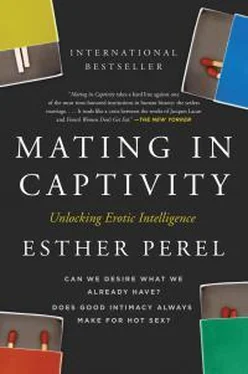“I haven’t felt this lousy in years,” Rose tells me. “But underneath, I can see it needed to happen. I’ve always focused on the tangible stuff—the money, the house, the kids in college—thinking that’s what’s solid. But who says that what Charles is after is so frivolous? Maybe it’s another way of taking care of a marriage.”
By refusing to acknowledge anything that falls outside the accepted range of behavior, Charles and Rose had achieved the opposite of what they were seeking. Rather than making their love more secure, they had, in fact, made it more vulnerable. But allowing both of them to reveal heretofore segregated parts of themselves was not without risk. The very foundation of their relationship was at stake. Each of them would have to tolerate the unfolding of the other, even if it took them beyond their range of comfort.
Dismantling the Security System
We often expect our relationship to act as a buttress against the slings and arrows of life. But love, by its very nature, is unstable. So we shore it up: we tighten the borders, batten down the hatches, and create predictability, all in an effort to make us feel more secure. Yet the mechanisms that we put in place to make love safer often put us more at risk. We ground ourselves in familiarity, and perhaps achieve a peaceful domestic arrangement, but in the process we orchestrate boredom. The verve of the relationship collapses under the weight of all that control. Stultified, couples are left wondering, “Whatever happened to fun? What ever happened to excitement, to transcendence, to awe?”
Desire is fueled by the unknown, and for that reason it’s inherently anxiety-producing. In his book Open to Desire , the Buddhist psychoanalyst Mark Epstein explains that our willingness to engage that mystery keeps desire alive. Faced with the irrefutable otherness of our partner, we can respond with fear or with curiosity. We can try to reduce the other to a knowable entity, or we can embrace her persistent mystery. When we resist the urge to control, when we keep ourselves open, we preserve the possibility of discovery. Eroticism resides in the ambiguous space between anxiety and fascination. We remain interested in our partners; they delight us, and we’re drawn to them. But, for many of us, renouncing the illusion of safety, and accepting the reality of our fundamental insecurity, proves to be a difficult step.
2
More Intimacy, Less Sex
Love Seeks Closeness, but Desire Needs Distance
Love and lust are inseparable parts of a larger whole for some, while for others they are irretrievably disconnected. Most of us, however, express our eroticism somewhere in the gray areas where love and lust both relate and conflict.
—Jack Morin, from The Erotic Mind
IN ANY FIRST CONVERSATION WITHa couple, I always ask how they met and what attracted them to each other. Since we associate therapy with problems, people usually don’t come to me when they are still in the initial thrall of love. Sometimes they need a gentle reminder of what once was. It can be difficult for estranged or distressed couples to focus on what drew them together, but within every couple’s “creation myth” lies the key to understanding the unfolding story of their relationship.
“She was beautiful.” “He was so smart and funny.” “He had pizzazz, and he exuded such self-confidence and style.” “For me it was her warmth.” “For me it was his gentleness.” “I knew she wouldn’t leave me.” “I loved his hands.” “His dick.” “Her eyes.” “His voice.” “He made great omelets.” The attributes that describe an idealized lover are always luxurious and bountiful. Love is an exercise in selective perception, even a delicious deception as well, though who cares about that in the beginning?
We magnify the good qualities of those we love, and confer on them almost mythical powers. We transform them, and we in turn are transformed in their presence. “He made me laugh.” “She made me feel special, smart.” “We could talk for hours.” “I knew I could trust her.” “I felt so accepted.” “He made me feel beautiful.” Such comments highlight the magnificence of the beloved or illuminate his capacity to enlarge us, to lift us from ourselves. As the psychoanalyst Ethel Spector Person writes, “Love arises from within ourselves as an imaginative act, a creative synthesis that aims to fulfill our deepest longings, our oldest dreams, that allows us both to renew and transform ourselves.” Love is at once an affirmation and a transcendence of who we are.
Beginnings are always ripe with possibilities, for they hold the promise of completion. Through love we imagine a new way of being. You see me as I’ve never seen myself. You airbrush my imperfections, and I like what you see. With you, and through you, I will become that which I long to be. I will become whole. Being chosen by the one you chose is one of the glories of falling in love. It generates a feeling of intense personal importance. I matter. You confirm my significance.
As I listen to couples describe the merging that accompanies the nascence of love, I get a glimpse of the dreams that propelled them toward each other. The first stage of any encounter is filled with fantasies. It’s a stream of projections, anticipations, and stirrings that may or may not evolve into a relationship. Here you are in front of someone you barely know, and you imagine climbing Kilimanjaro together, building an Architectural Digest home, making babies, or umpteen irresistible fantasies as arbitrary as the weather. As my patients recount the exaltation they felt, I am able to take a peek beneath the rubble to see what they once had.
A Hopeful State of Bliss
John and Beatrice spent their first six months virtually locked up in a room in a blissful state of effervescence. John is a stockbroker who has known the glories and defeats of the dot-com revolution. When I first met him in therapy he had just witnessed his fortune wither before his eyes. He would spend days staring at his computer screen, helplessly tracking the demise of his portfolio while he drank the last of his single-malt Scotch. He had also just experienced an erotic collapse in the midst of an otherwise loving and caring relationship with a girlfriend of five years. He was in the grip of a triple crisis—emotional, professional, and financial. When he met Beatrice, it was like waking up from a coma. His sense of relief and renewal was profound. Beatrice, a Pre-Raphaelite beauty, was a graduate student in English in her mid-twenties, ten years younger than John. In the cocoon under the sheets they would talk for hours, make love, talk again, make love, and sleep (but very little). Transported as they were in this early rapture, they felt free and open. They relished the meeting of their two worlds, were endlessly curious, and luxuriated in their feelings of mutuality and warmth, free from the torments of the outside world.
As the relationship between them evolved, John and Beatrice experienced a growing sense of serenity. The initial excitement matured, the real world reemerged, and hope was transformed into substance. Enter intimacy. If love is an act of imagination, then intimacy is an act of fruition. It waits for the high to subside so it can patiently insert itself into the relationship. The seeds of intimacy are time and repetition. We choose each other again and again, and so create a community of two.
When they move in together, John and Beatrice are introduced to each other’s tastes and preferences, and become more acquainted with each other’s quirks. John likes his coffee black. No sugar. And he needs his first cup as soon as he gets out of bed. Beatrice likes hers with cream, no sugar, but she likes to have a glass of water first. Some of these wants are met with ease and tenderness; some they must learn to accept; and some are annoying, offensive, or downright disgusting. They wonder how they’ll ever live with…(name the three most revolting habits of your own partner). They enter into each other’s world of habit, and this familiarity reassures them. It creates routine, which in turn fosters a sense of security. Growing familiarity also signals freedom from ceremony and constraint. Yet this unceremoniousness, which is a welcome feature of intimacy, is a proven antiaphrodisiac as well.
Читать дальше










